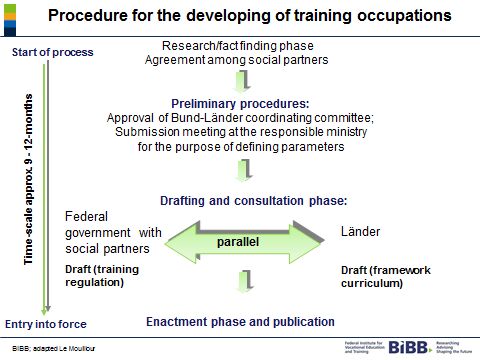Developing Qualifications in Germany
In Germany, apprenticeship training can only take place in state-recognized training occupations. The training regulations define the content of the training in an occupation. They are elaborated together with experts from the relevant occupation in a formal procedure. The whole process follows the principle of consensus.
Legal background
The Vocational Training Act defines the requirements that must be met by a training occupation. It stipulates that initial vocational education and training has to provide the abilities, knowledge and skills (professional ability to act) necessary to undertake a qualified vocational activity in a changing working environment and through a well-regulated course of training. It also has to enable the acquisition of the occupational experience required (Article 1, Paragraph 3 BBiG).
Initial vocational education and training as governed by the Vocational Training Act leads to qualifications as skilled worker (Facharbeiter), journeyman (Geselle), or specialised employee (Fachangestellter) [level 4 of the German Qualification Framework GQF]. Advanced vocational education and training leads to qualifications at DQR levels 5–7, such as certified service technician (Geprüfter Servicetechniker) [level 5], certified master craftsperson (Geprüfter Meister) [level 6], und certified vocational training specialist (Geprüfter Berufspädagoge) [level 7]. For the advanced training occupations, new titles were introduced as a result of the 2020 amendment of the Vocational Training Act, e.g. “Bachelor Professional” for qualifications at level 6.
Content of a training regulation
The training regulations define minimum requirements for a modern course of training. They include:
- a description of the typical “skills, knowledge and abilities” of the occupation,
- the duration of the training,
- the framework training curriculum for the in-company training and
- the requirements for the examination at the competent body.
The training regulation is a framework document which applies to the in-company training and gives orientation for the school-based teaching. The contents are matched with the framework curricula for the vocational part-time schools.
The requirements are set in a technologically neutral and function-oriented manner to ensure that the training companies can integrate new developments into their training. Qualification requirements that are identical in all vocational training occupations are integrated into all training ordinances as standard occupational profile items. In 2020, the standard occupational profile items “organisation of the training provider, vocational training, and labour law and collective bargaining law” and “occupational health and safety at work” were updated. Standard occupational profile items for “environmental protection and sustainability” and “digitalised world of work” have been added.
Initiation for the renewal or creation of new training occupations
The trade associations, the employers’ umbrella organisations and the trade unions usually initiate the renewal of an existing training occupation or the creation of a new training occupation. They present their common ideas regarding content and structure to the ministries in charge, and the decision is then taken by the competent Federal Ministry in coordination with the Federal States after consulting all stakeholders. In some case the BIBB carried out a research project to evaluate the existing training occupation or assessed the demand for a new training occupation in advance.
Elaboration process
The elaboration of a new or modernized training regulation starts with a directive from the ministry in charge to the BIBB. This is a regulated procedure involving several stakeholders.
- An equal number of experts (usually three per occupation) from the companies named by the umbrella organisations of the social partners and representing the interests of employers and employees in the occupation,
- two “coordinators” – one per social partner – representing the political interests and coordinating the experts named by their umbrella organisation,
- representatives of the relevant federal ministries,
- (a) representative(s) of the Standing Conference of the Ministers of Education and Cultural Affairs (KMK) of the Federal States as well as (a) vocational school teacher(s) for the occupation representing the committee elaborating the framework curricula for vocational schools and
- the BIBB VET expert(s) that organise and moderate the elaboration process.
The elaboration process starts with a directive from the ministry in charge to the BIBB. After finalisation, the draft of the regulation has to pass the BIBB Board and the “Federal/State Coordinating Committee for Vocational Education and Training” as well as be subjected to a legal review.
Training regulations are enacted for recognised training occupations by the relevant ministry, usually the Federal Ministry for Economic Affairs and Climate Protection (BMWi), in agreement with the Federal Ministry of Education and Research (BMBF). They contain minimum standards for the in-company part of initial vocational education and training.
The framework curricula for vocational schools are based on the corresponding framework training curricula in the training regulations for the in-company training, so that in-company training and vocational school education complement one another. The coordination procedure is regulated in an agreement between the Standing Conference of the Ministers of Education and Cultural Affairs (KMK) of the Federal States and Federal Government (“joint memorandum”).
